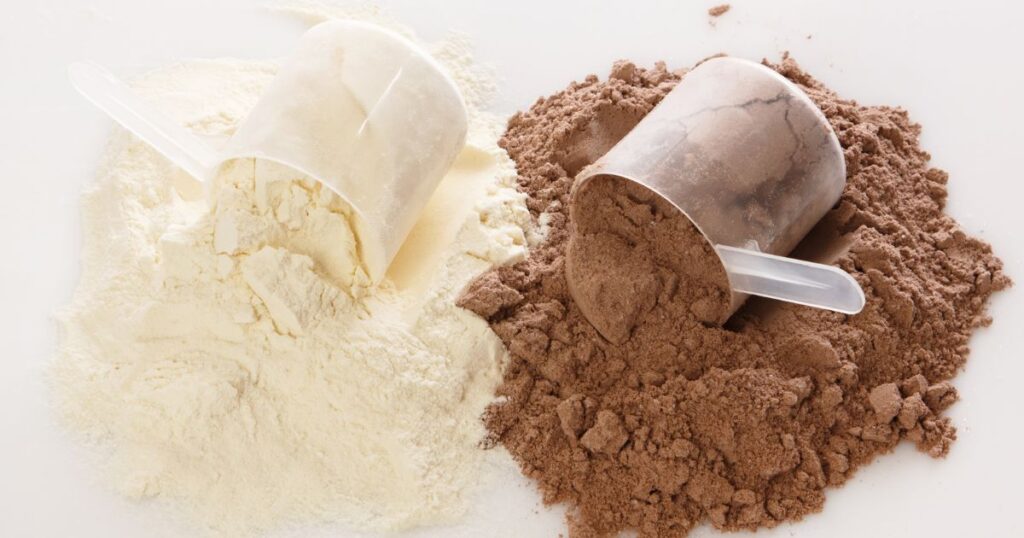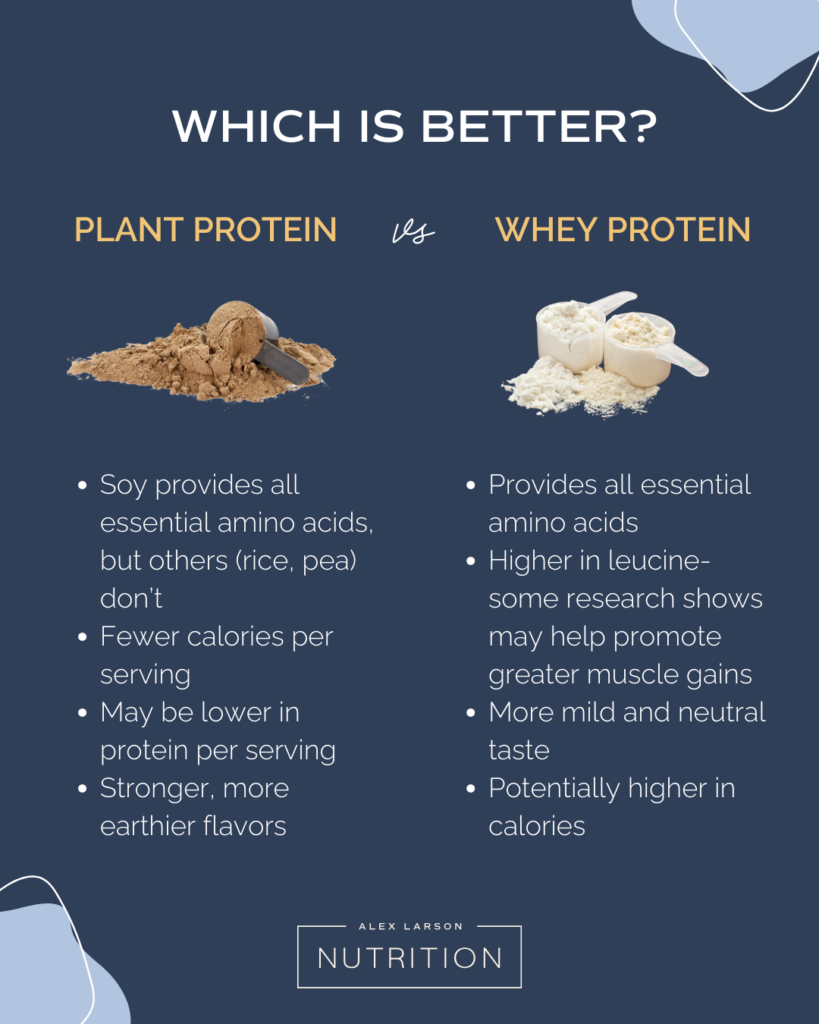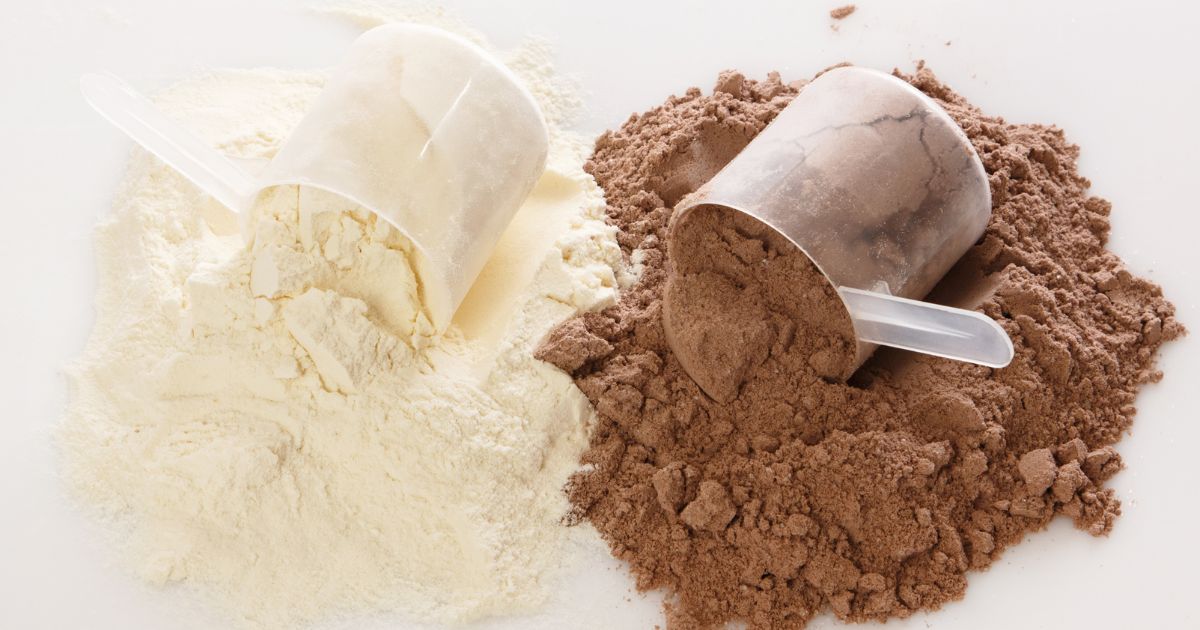RUNNING →
Level Up Your Nutrition Game With Our Freebies
Alex
I provide nutrition coaching for endurance athletes to improve performance and body composition through a simple and flexible eating style.
Hi, I'm
ATHLETE EATING GUIDE →
PROTEIN →
TRIATHLON →
RECIPES →
PERFORMANCE NUTRITION →
SUPPLEMENTS →
HOLIDAY & TRAVEL →
PLANT-BASED →
FEMALE ATHLETE NUTRITION
Explore the Blog
LEARN MORE →
ATHLETE GROCERY SHOPPING GUIDE →
RACE DAY: TRIATHLON NUTRITION PLANNER →
READY TO FUEL?
incredible value!
The fueling guide bundle serves as your one-stop-shop for strategies to fueling before, during and after your workouts.
ENDURANCE EATS
BINGE-WATCH READY!
YOUTUBE SERIES
Plant protein vs whey protein, so very glad you asked! Protein powder is a valuable nutrition tool for endurance athletes seeking to enhance their performance and support recovery.
While carbohydrates are important for sustained energy during workouts, protein plays a large role in repairing and rebuilding muscle tissues. Protein powder, often in the form of plant-based sources or whey, offers a convenient and highly concentrated source of this essential nutrient. Regular consumption can aid in muscle recovery, reduce muscle soreness, and support overall endurance. This allows athletes to push their limits day in and day out.
However, when it comes to protein powders, the endless options can feel overwhelming. Let’s compare plant protein vs whey to help determine the best option for you!
Protein Benefits for Endurance Athletes

Compelling research shows that adequate protein intake in endurance athletes speeds up muscle recovery and offsets muscle damage from the rigors of training. Protein is also important for a variety of bodily functions including:
- Digesting and breaking down food
- Growing and repairing body tissues
- Hormone production
- Providing energy as a fuel source
- Maintaining healthy skin, hair, and nails
- Building lean body mass
- Boosting immunity
- Providing satiety otherwise known as that feeling of “fullness”
Amino acids are considered the building blocks of protein. When proteins are digested and broken down, amino acids are the result. There are 20 amino acids, 11 of which are “non-essential”, meaning the body can produce. The 9 amino acids remaining are “essential” because the human body cannot produce them on its own. A food is considered a complete protein when it contains all 9 essential amino acids.
Animal proteins are considered complete, and fortunately, there are also several plant-based sources of complete protein. This includes soybeans, quinoa, buckwheat, hempseed, and blue-green algae.
Worried about getting enough complete protein food sources in your diet? If you are eating a wide variety of protein in your diet, there is a very good chance you do not need to stress. Just be sure to be consistent with including variety in meals and snacks!
Protein Needs for Runners and Endurance Athletes
Most endurance athletes, including plant-based athletes, will benefit from 1.2-2.0g of protein per kilogram of body weight per day. This varies largely depending on the individual though for each person, protein intake should be spaced throughout the day among meals and snacks. Most athletes fall short of their protein targets regularly, but meeting those needs doesn’t need to be overcomplicated.
If you are constantly falling short of meeting your protein needs, be sure to utilize protein-rich foods in your meal-prepping routine regularly. Poultry, fish, beef, pork, eggs, dairy, including Greek yogurt and cottage cheese, protein bars, and protein powder supplements are all good animal-based sources of protein. Plant-based options include tofu, tempeh, seitan, edamame, beans and lentils, protein bars, and plant-based protein powder supplements.
If you are looking for more creative ideas for boosting your protein intake regularly, be sure to reference our high-protein breakfast, lunch, and snack blog posts!
Protein Powders for Runners and Endurance Athletes

Protein powder provides a quick, convenient solution for optimizing protein intake throughout the day. Especially when you’re on the go and need something portable. Choosing a quality protein powder will offer a concentrated and easily digestible protein source. These products are designed to be absorbed quickly and deliver the needed amino acids to your recovering muscles from the rigors of training and racing. Though with the versatility of protein powders available online and at the grocery store, it is tricky to know what to opt for and what products to avoid.
Plant Protein vs Whey Protein: The Protein Dilemma
Available plant protein options often include soy, pea, hemp, brown rice, pumpkin seed, and flax proteins, among others. Many plant-based protein powders use a combination of these specific protein sources so they contain all 20 amino acids.
Whey and casein protein are animal-based protein powders. Whey are casein are the types of protein found in cow’s milk that are dried into a powder form. These are considered very high-quality proteins that contain all essential amino acids. Whey is also an excellent source of the amino acid Leucine. Leucine is well-researched and plays the role of signaling the body to start building muscle. Collagen is also available as a protein-containing supplement but does vary nutritionally from whey and casein protein powders.
Be sure to check out our detailed post on collagen here.
The Battle of Nutrition: Plant Protein vs Whey Protein
Nutrition profile and taste are just a few important characteristics to consider when selecting a protein powder. There is no one-size-fits-all option that works for every athlete so it is important to choose what works best for you! Several factors should be considered when perusing the grocery store aisles.
Protein Quality and Completeness.
Plant protein powder and whey protein differ in their protein quality. Whey protein contains all essential amino acids, making it highly effective for muscle building. Plant protein powders, like pea or brown rice protein, may lack certain amino acids, requiring combinations for completeness. Though soy-based protein powders will also be a complete protein option. Research shows that both whey and soy-based protein powders can help optimize an increase in lean body and strength. However other research does show that because of its higher leucine content, whey protein helps promote greater gains in lean body mass than soy.
Calories and Macronutrients.
Plant protein and whey protein can differ in calorie content. Generally, plant-based protein powders, like pea or rice protein, may contain fewer calories per serving compared to whey protein. This can be advantageous for those aiming to manage their calorie intake while still meeting their protein needs. However, specific calorie counts may vary among different brands and formulations. Some of the plant-based options may be much lower in protein than whey-based options.
Taste.
Taste differences between plant protein and whey protein are noticeable. Whey protein often has a milder, more neutral taste, making it easier to incorporate into various recipes. In contrast, plant protein powders can have stronger, earthier flavors, which may require additional flavoring or blending to enhance palatability, depending on personal preferences.
Affordability.
Fortunately, most protein powders are quite inexpensive per serving and also have a longer shelf-stable life than many other protein sources. Plant-based protein powders and whey protein powders range widely in cost depending on the specific brand. It is important to remember that just because a protein powder is more expensive, it does not make it higher quality.

How to Use Protein Powders
Protein powders are convenient and relatively easy to use for on-the-go travel and workouts. Most protein powders are stored in medium-sized containers which allow for easy scooping and mixing of the powder with a liquid such as milk or plant-based milk alternative.
Protein powders can be an excellent addition to a meal or as a post-workout snack. Protein powders blend well with fresh or frozen fruit or pair with milk and almond butter for a refreshing addition to your morning bowl of oatmeal.
If you are utilizing the protein powder post-workout, ideally you are refueling within 60 minutes of your workout. Because most protein powders are low in carbohydrates, adding a banana or a bowl of cereal with the protein powder is ideal. Reference our protein blog post for more protein-related specifics.
Considerations Before You Begin

As this performance nutrition post discusses, it is important to make sure that you are opting for high-quality nutrition supplements. Be sure to purchase a protein powder supplement that is third-party tested such as Informed Choice for Sport or NSF-certified. A supplement brand that I love and trust is Thorne Research! You can use this link to get 15% off your order. Unfortunately, there are many low-quality products available that have tested positive for various substances including heavy metals and contaminants.
It is also important to read ingredient labels before selecting a protein powder. Some protein powders contain unnecessary ingredients such as added fibers, artificial sweeteners, or sugar alcohols which can lead to unwanted gastrointestinal issues.
As always, I encourage you to speak with your medical care provider before starting any nutrition supplement to ensure safety.
Which is Better Plant Protein vs Whey Protein?
Truthfully, we will let you choose what you prefer. Because ultimately, both can make worthy options for athletes. And, let us know what you like best!
There is no one-size-fits-all approach to nutrition recommendations for endurance athletes. Truly, this depends on the individual as each person has unique taste and texture preferences and specific nutrition goals.
Needing personalized help with your endurance nutrition?
For individualized guidance and support on fueling your training, reach out, and let’s talk about 1:1 nutrition coaching. We provide personalized accountability and strive to teach you how to create a sustainable and flexible eating style to meet your needs as an athlete.
Alex
I provide nutrition coaching for endurance athletes to improve performance and body composition through a simple and flexible eating style.
Hi, I'm
LEARN MORE →
take the quiz!
Let's discover your Endurance Nutrition IQ
How well do you know your fueling? Answer these questions and let's see where your endurance nutrition knowledge is at!
Take the quiz
level up your nutrition game with these freebies
free downloadS
Protein-Packed 10-Day Sample Meal Plan
Athlete Eating Guide
Athlete Grocery Shopping Guide
1
2
3
Inspiration to fit 120 grams of protein into your day
Planning what goes on your plate
Putting the right foods in your grocery cart
